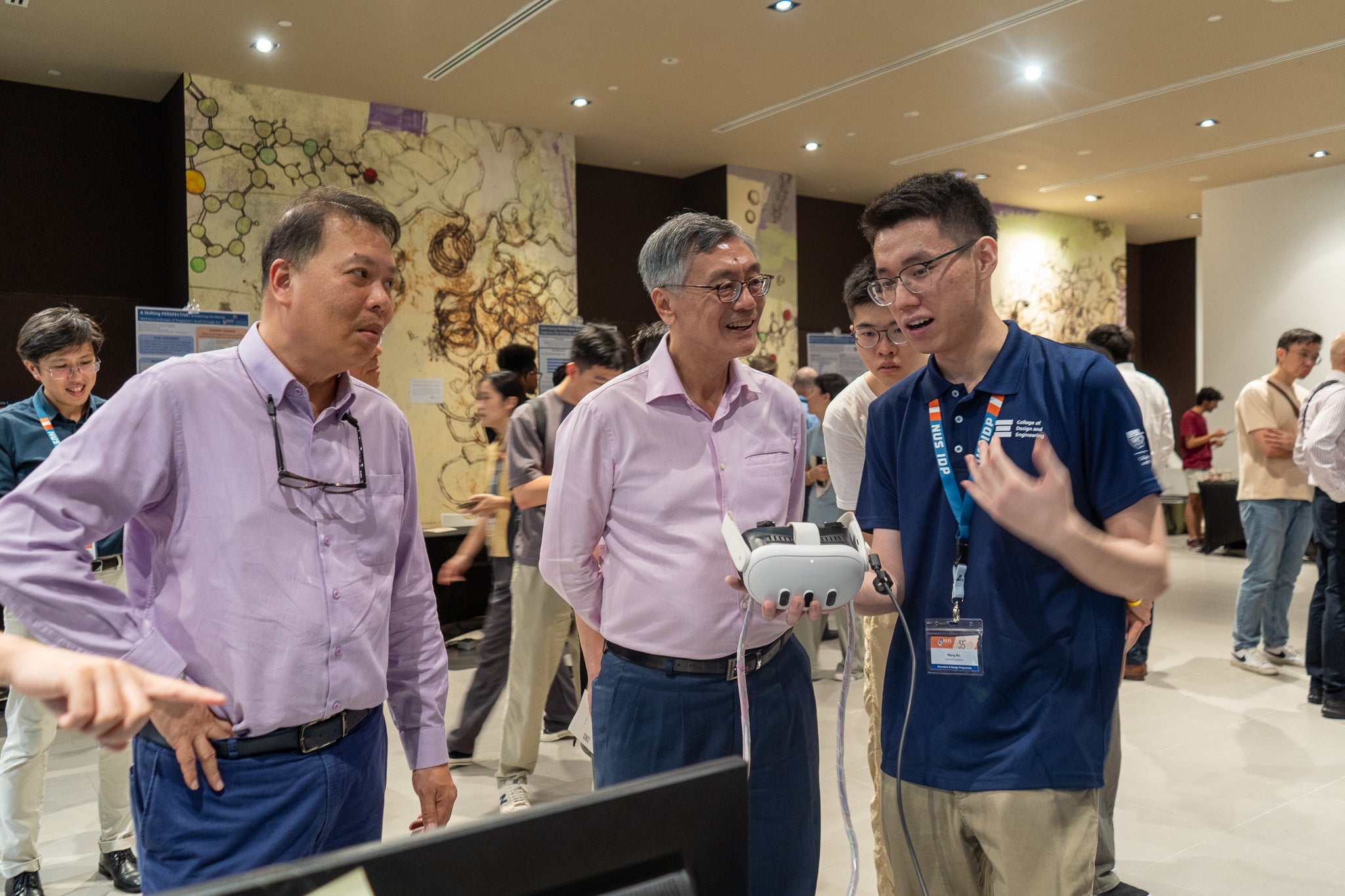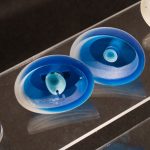
From solutions in healthcare to creating more comfortable seats for low-cost airline carriers and even projects dealing with space exploration, the EDIC Project Showcase 2025 brought together a slew of innovative ideas to deal with real-world problems and challenges.
Held on 16 April 2025, the showcase celebrates the completion of year-long projects by Year 4 students in the Innovation and Design Programme (iDP) and students in the Master of Science in Engineering Design and Innovation (MSc EDI) programme.
NUS President Professor Tan Eng Chye visited the showcase and interacted with some of the students present, learning more about their projects through poster presentations and prototype demonstrations.

More than 40 projects were present, covering themes such as healthcare, sustainability, smart solutions, robotics, and immersive reality.
The Mushroom Things
In Singapore, 65 per cent of unrecycled biological waste (horticultural and food) is incinerated, releasing harmful pollutants and carbon dioxide into the environment. To combat this waste, this project uses mycelium technology to convert the waste into mycelium furniture, creating a circular economy.

The Mushroom Things is an interdisciplinary collaboration between Jasmine Xie (Business Administration) and Chan Pak Hong (Environmental Engineering) and was developed as part of CDE4301A (Ideas to start-up).
Re-designing economy class seats for low-cost carriers

Helmed by Mechanical Engineering students Kirubasankar Mageshkumar and Ramie Lim, this project redesigned economy class seats on low-cost carriers (LCCs) to eliminate discomfort, improve passenger experience and introduce a new competitive factor for comfort. The team focused on three key areas to make the flying experience on LCCs more comfortable at a minimal rise in cost:
- Eliminating shear force (the tendency to slide forward when you lean back)
- Relieving pressure points on the body
- Accommodating a range of body types
Growth optimisation of cyanobacteria
As carbon dioxide emissions continue to contribute to climate change, there is an urgent need to find alternative carbon capture solutions. The team - made up of Mechanical Engineering undergraduates Aaryana Aroop Pradhan, Ahluwalia Pahaul and Naadiah Bte Mohamed Ibrahim - focused on optimising the growth of cyanobacteria, which are microscopic organisms that can absorb carbon dioxide and produce sustainable biomaterials.

They studied how lighting conditions can affect the growth and carbon capture abilities of three different strains of cyanobacteria. Their findings aim to allow researchers to develop more efficient and sustainable carbon capture methods by optimising lighting quality, period and intensity to maximise the carbon capture capabilities of cyanobacteria.
EyeWonder: revolutionising contact lens handling for myopic children
Children with myopia who are required to wear contact lenses are often overcome with anxiety when first learning to insert and remove the lenses. The EyeWonder tool was developed to reduce this anxiety by making contact lens usage easier for children.

Led by Lakshmi Sujeesh (Biomedical Engineering), EyeWonder facilitates hands-free lens insertion and removal while reducing anxiety associated with the lens approaching the eye while assisting to keep the eyelids open for a smoother and more hygienic application process.
EyeWonder clinched the top prize at the recent Duke-NUS Health Innovator Programme (DHIP) Dazzle Day, receiving a $50,000 grant to continue research and development.
EasyConvo
Developed as part of CDE4301A (Ideas to Start-Up), EasyConvo is the brainchild of A. Guhanavel (Data Science and Analytics), Kedrian Loh (Computer Engineering) and How Yong Yang (Electrical Engineering). They developed EasyConvo to bridge the gap in conversational practice for languages by enabling educators to create scenario-based exercises in a no-code, low-prompt environment. Students can practice in real time and receive personalised feedback while building their speaking confidence and fluency.

The team recently clinched the first runner-up prize in the CDE Innovation Day Eureka Challenge, earning themselves $10,000 in VIP grants as well as access to The Hangar at NUS Enterprise.
SmoScope
SmoScope was developed to enhance firefighter visibility and rescue efficiency by integrating thermal imaging with an intelligent smoke-elimination algorithm in an AR goggle mask, enabling first responders to see through smoke in real time, locate trapped victims, and improve survival rates. SmoScope was developed by MSc Engineering and Design Innovation students Huang Huiyi, Ji Shuting, Li Qingyun and Sun Haoran.

Their solution utilises an infrared camera embedded into the frame of the goggles, which then sends a feed that is displayed on the visor using Smart Optical Waveguide AR.
To learn more about all the projects on display, as well as to find out all the prize-winners from the showcase, visit: https://cde.nus.edu.sg/edic/projects/showcase/edic-project-showcase-2025/





























